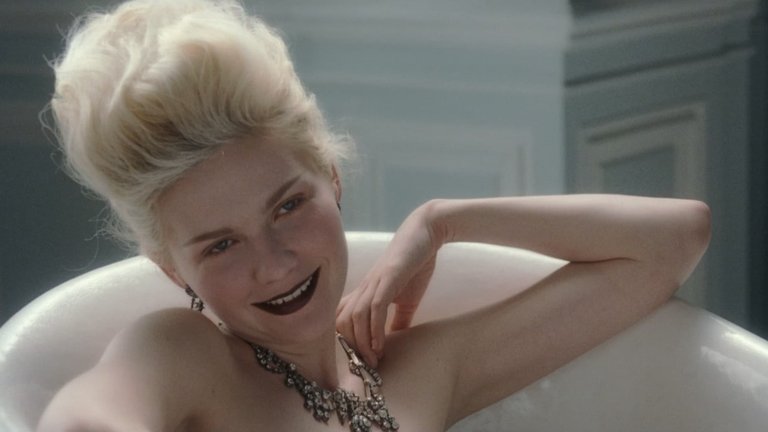Film Review: Marie Antoinette (2006)

Sofia Coppola has successfully redeemed herself from the criticism she faced for her disastrous acting in her father's The Godfather Part III by establishing herself as a notable director. Her first two feature films, The Virgin Suicides and Lost in Translation, garnered significant acclaim, establishing her as a unique voice in contemporary cinema. However, her third film, the 2006 biopic Marie Antoinette, became the first major hiccup in her directorial career, as it received sharply divided reviews from critics.
The film is adapted from Lady Antonia Fraser's 2001 biography, Marie Antoinette: The Journey, which offers a revisionist perspective on the life of the ill-fated queen, traditionally portrayed as a villain in narratives surrounding the French Revolution, Coppola’s screenplay focuses on the years leading up to the violent upheaval. The narrative begins in 1770, when the 14-year-old Maria Antonia, played by Kirsten Dunst, youngest daughter of Empress Maria Theresa (played by Marianne Faithful) leaves her home in Austria to France in order to marry Dauphin Louis (played by Jason Schwartzman), the son of King Louis XV (played by Rip Torn). This marriage was intended to solidify the Franco-Austrian alliance. However, Marie, who adopts the name Marie Antoinette, is more preoccupied with her struggles to adapt to the rigid lifestyle of the French court and her husband’s apparent disinterest in their marriage, which raises concerns about lack of heir and the future of the dynasty. As the story unfolds, Marie’s initially carefree existence becomes overshadowed by the brewing political and economic crises in France, eventually leading to the Revolution, which she remains largely oblivious to until it erupts.
Visually, Marie Antoinette is a stunning film, with a budget of $40 million primarily allocated to recreating the opulence of the pre-revolutionary French aristocracy. The film’s most significant achievement lies in its elaborate and colourful costumes, which, while historically inspired, include some deliberate anachronisms. This attention to detail earned the film its only Academy Award, for Best Costume Design, showcasing Coppola's commitment to creating a visually immersive experience that captures the excesses of royal life.
In an attempt to differentiate her biopic from traditional historical dramas, Coppola incorporated an anachronistic soundtrack featuring 1980s pop and rock music. While this idea is intriguing and aims to connect contemporary audiences with the emotional landscape of Marie Antoinette, its execution often feels lacking. As the novelty of the soundtrack wears off, the film risks appearing pretentious, overshadowing the deeper narrative with stylistic choices that may alienate viewers looking for a more authentic historical representation.
The cast of Marie Antoinette delivers solid performances, particularly Kirsten Dunst, who embodies the character's transformation from a naive teenager to a similarly naive adult. Dunst’s portrayal is infused with a natural charm, effectively capturing Marie’s innocence and eventual disillusionment. However, her commendable efforts cannot fully compensate for the script's deficiencies, as the character of Marie Antoinette remains shallow and underdeveloped, leaving little for the actors to work with.
Conversely, Jason Schwartzman’s portrayal of Louis XVI is often perceived as miscast, rendering the character bland and lacking depth. The chemistry between Dunst and Schwartzman is notably weak, which detracts from the emotional stakes of their relationship and further diminishes the film’s impact.
Among the performances, Rip Torn’s portrayal of Louis XV stands out, showcasing a more nuanced understanding of his character. However, his role is disappointingly brief, leaving audiences wishing for more of his presence in the narrative.
A significant criticism of Marie Antoinette is its narrow focus on the titular character’s sheltered and inconsequential life, neglecting the broader political context of the time. The film treats the early stages of the Revolution as a mere backdrop and convenient way to conclude the plot, failing to engage with the historical complexities that led to such upheaval. This lack of depth has led many critics to label the film as superficial, arguing that it misses an opportunity to provide a more comprehensive exploration of the societal issues at play.
There have been speculations suggesting that Marie Antoinette may have autobiographical elements, as Coppola, a daughter of Hollywood royalty and epitome of “nepo baby” before the term was invented, could see parallels between her own privileged upbringing and that of the Habsburg princess. This interpretation suggests that Coppola’s personal experiences may have influenced her portrayal of Marie’s isolation and struggles within a constraining societal framework.
Ultimately, Marie Antoinette, with its two-hour runtime, may test the patience of many viewers, including those who typically enjoy historical biopics. When compared to other films that have tackled the French Revolution, Coppola's work often falls short, lacking the dramatic weight and historical engagement that characterises more successful portrayals. Consequently, this film may only be recommended to the most dedicated fans of Coppola’s work or those with a particular interest in the life of Marie Antoinette.
RATING: 3/10 (+)
Blog in Croatian https://draxblog.com
Blog in English https://draxreview.wordpress.com/
InLeo blog https://inleo.io/@drax.leo
Hiveonboard: https://hiveonboard.com?ref=drax
Rising Star game: https://www.risingstargame.com?referrer=drax
1Inch: https://1inch.exchange/#/r/0x83823d8CCB74F828148258BB4457642124b1328e
BTC donations: 1EWxiMiP6iiG9rger3NuUSd6HByaxQWafG
ETH donations: 0xB305F144323b99e6f8b1d66f5D7DE78B498C32A7
BCH donations: qpvxw0jax79lhmvlgcldkzpqanf03r9cjv8y6gtmk9
I watched this film in 9th grade history class. I enjoyed it, definitely must watch again!
This was an epic film. I first watched it in 2008 and it was a very unique interpretation of the whole Marie Antoinette era. And the soundtrack to this film was unbelievable, not the usual strings and pianos. Nope, you had all sorts of contemporary pop and rock music artists.